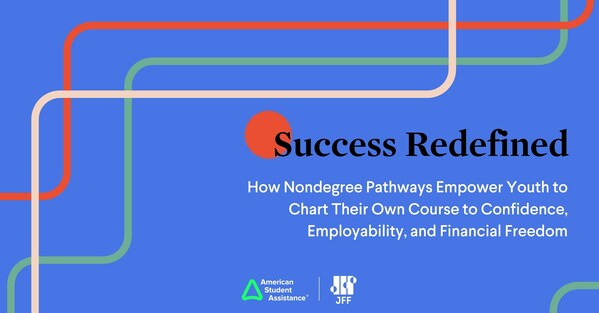
JFFVentures Impact Report 2024
Reflecting on the Progress and Impact of Our Portfolio Companies in 2024 Our Impact to Date Related Content
October 17, 2023
American Student Assistance and Jobs for the Future release new survey that examines non-college bound youth’s perspectives on education and career plans
BOSTON, Oct. 17, 2023 /PRNewswire/ — A new survey commissioned by American Student Assistance ® (ASA) and Jobs for the Future (JFF) found that while young people who pursue nondegree pathways report having confidence in their future, there is a pervasive lack of awareness about these diverse pathways to success and how to judge their quality. In fact, two in three youth who did not pursue a nondegree education pathway indicated they would have considered this option if they had known more about it.

As college enrollment remains below pre-pandemic levels and survey after survey captures growing public skepticism about the value of college, ASA and JFF commissioned a survey – conducted by Morning Consult – of more than 1,100 high school graduates who have opted not to go to college directly after high school to better understand their decisions.
The survey explores the perceptions, feelings, and choices of three groups of students pursuing a nondegree postsecondary program, such as apprenticeships, bootcamps, certificate programs, industry certifications, and occupation licenses versus students who are not pursuing postsecondary education or training programs. The three groups of learners surveyed include: Non-college youth: Those neither enrolled nor graduated from a college (encompasses all survey respondents); Pathway youth: Those who pursued or are pursuing any nondegree postsecondary pathway (describes 558 of survey respondents); and Non-pathway youth: Those who didn’t pursue or aren’t pursuing any nondegree postsecondary pathway (describes 561 of survey respondents).
Among the key findings:
“A growing number of young people are interested in diverse postsecondary pathways that enable them to build a life and career on their own terms. But acquiring the skills needed to thrive in a dynamic workforce can be unclear and confusing for learners. It’s the responsibility of policymakers, advocates, and educators to ensure young people have the information and opportunities necessary to build those skills,” said Jean Eddy, President and CEO of ASA. “With this survey, we seek to learn from young people in order to better understand the support needed to help them with their future planning.”
“It’s clear many Gen Z youth are looking for faster, more affordable, and more relevant pathways to meaningful jobs that offer life-sustaining wages and are aligned to their aspirations and interests,” said Maria Flynn, President and CEO of Jobs for the Future. “As we transform education and workforce development systems by blurring the lines between high school, postsecondary education, and career training, helping young people access clear, accurate, and timely information about diverse education-to-career pathways is critical.”
The complete survey findings can be found in a new white paper, “Success, Redefined: How Non-Degree Pathways Empower Youth to Chart Their Own Course to Confidence, Employability, and Financial Freedom,” released today by ASA and JFF. In addition to the survey findings, the white paper highlights direct accounts from four young people who have pursued a range of pathways after high school from on-line courses and certificates, to bootcamps and apprenticeship programs.
About American Student Assistance
American Student Assistance® (ASA) is a national nonprofit changing the way kids learn about careers and navigate a path to postsecondary education and career success. ASA believes all students should have equitable access to career readiness learning, starting in middle school, so they will be equipped to make informed, confident decisions about their futures. ASA fulfills its mission by providing free digital-first experiences, including Futurescape® and Next Voice™, and EvolveMe™, directly to millions of students, and through impact investing and philanthropic support for educators, intermediaries, and others. To learn more about ASA, visit www.asa.org/about-asa.
About Jobs for the Future:
Jobs for the Future (JFF) drives transformation of the U.S. education and workforce systems to achieve equitable economic advancement for all. www.jff.org
SOURCE American Student Assistance (ASA)

Reflecting on the Progress and Impact of Our Portfolio Companies in 2024 Our Impact to Date Related Content

This two-pager summarizes findings from our new 50-state analysis outlining how states can build more effective career navigations systems for young people & identifying which states have adopted key policies to achieve that goal. Few…

This interactive tool developed by the Federal Reserve Bank of Philadelphia allows users to explore career paths and visualize how job skills needed for specific occupations can transfer to higher-paying occupations in the same geographical area.…